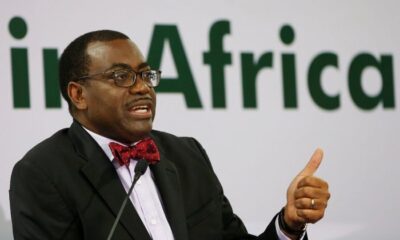Business
Nigerian Banks and Entrepreneurs
Published
9 years agoon

Olaseni Durojaiye in this report examines the relationship between banks and private businesses in Nigeria, regretting that the way some banks go about their businesses may dampen entrepreneurship spirit and stifle the economy.
The world over, entrepreneurs occupy a central position in any market economy. They serve as the spark plug in the economy’s engine, activating and stimulating a greater percentage of economic activities. The economic success of nations worldwide is the result of encouraging and rewarding the entrepreneurial instinct. A society is prosperous only to the degree to which it rewards and encourages entrepreneurial activities because the entrepreneurs and their activities (form the two legs of the tripod that are the critical determinant of the level of success, prosperity, growth and opportunities in any economy. The critical third being inter-related issue of regulations and compliance
This explains why an analyst posited that “The most dynamic societies in the world are the ones that have the most entrepreneurs, plus the economic and legal structure to encourage and motivate entrepreneurs to greater activities.”
Managers of great economies go to great length to promote entrepreneurship because they recognize that the story of competiveness of their business environment is best told by using the same entrepreneurs to tell the story.
Between Banks and the Economy
Economists argued that banks and financial institutions on the other hand contribute to economic development and the improvement in living standards by providing various services to the rest of the economy. Some of these services are offered through clearing and settlement systems to facilitate trade, channeling financial resources between savers and borrowers, and various products to deal with risk and uncertainty.(The role of the banks as financial intermediaries has a major bearing on how efficiently the economy allocates its resources between competing uses.
According to a Research Analyst with Frigate Consult, a Lagos based financial advisory firm, Soji Ibiwoye, “commercial bank is basically a collection of investment capital in search of a good return by granting loans and extending credit to people who can pay it back on the bank’s terms.
This is why banks specialise in assessing the credit worthiness of borrowers and providing an ongoing monitoring function to ensure borrowers meet their obligations. They are rewarded for these services by the spread between the rates they offer to the accumulated pool of savers, and the rates they offer to potential borrowers. This process is at the heart of modern banking,” Ibiwoye explained. He however added that “Whether the structure of Nigeria’s financial system is optimal for the economic growth outcomes the country would like to achieve is another topic entirely.”
It is somewhat difficult to measure the impact of banks financing in providing support for entrepreneurs in Nigeria.
However, there have been some success stories and leading lights that signpost Nigeria’s entrepreneurial spirit. Aliko Dangote owns the Dangote group, a conglomerate with interests that cover food processing, cement manufacturing and freight. The company operates in Nigeria and other African countries, including Benin, Cameroon, Ghana, South Africa, Togo, Tanzania, and Zambia. The Dangote Group employs over 11,000 people.
Astute and highly successful investor and entrepreneur, Otudeko’s Honeywell Group invests in diverse sectors of the economy since its inception in 1972 and has grown to become one of Nigeria’s leading indigenous conglomerates.
The Honeywell Group is now a major diversified group engaged in select businesses in key sectors of the Nigerian economy, namely; foods and agro-allied, energy (oil, gas and power), infrastructure, services and real estate, and through other portfolio investments the group is also a significant provider of capital to other sectors of Nigeria’s economy. Honeywell Group employs over 10,000 people.
In the services sectors, Jim Ovia and Tony Elumelu stand out. Ovia is the promoter and founder of Visafone and was a co-Founder of Zenith Bank Plc while Tony Elumelu is the Chairman of Heirs Holdings, the United Bank for Africa amongst other interests.
Check also revealed that these entrepreneurs through their businesses have at certain times enjoyed and continue to enjoy the support of the Nigerian banking and financial system through loans and credits with which the businesses are funded for growth and expansion. It is fair therefore to conclude that the Nigerian economy is fueled by entrepreneurship and funded by the banks.
Ibiwoye insisted that these two must work hand in hand and argued that no one can exist without the other adding that the relationship banks have with their customers and businesses must therefore be maintained with a degree of professionalism as expected from a well-regulated sector.
Between Banks and Entrepreneurs
Due to the numerous risks that are inherent in commercial/contractual transactions, disputes are often times inevitable.
The banker – customer relationship being contractual in nature is not exempted. With the pivotal role of banks in the growth of entrepreneurship in Nigeria, analysts argue that it is essential that there is a strict adherence to professional and ethical standards within the industry and also a framework for the resolution of disputes arising from a departure from established standards and practices.
One of the initiatives set up to address customer complaints and disputes arising from banking practices was the establishment of a sub-committee on “ethics and professionalism” by the Bankers’ Committee. The Bankers’ Committee is an umbrella body comprising the Central Bank of Nigeria and commercial banks.
Whilst the Sub-committee on Ethics and Professionalism has resolved over 1000 cases or petitions since it was established in December 2000, the Sub-committee’s ability to ensure compliance by the banks with its decisions remains a critical issue. This has led some of the often asked questions among industry insiders: Can entrepreneurs rely on the Sub-committee to ensure that all banks adhere to the code of ethics and professionalism? Can the decision of the Sub-Committee compel a bank to honour its commitments/responsibilities to a customer?
The ongoing situation between Honeywell and Ecobank highlights these issues and the impact they can have on the growth of entrepreneurship and the economy. “This may turn out to be a litmus test for the bankers’ Committee,” stated a branch manager with one of the third generation banks. “How the saga plays out will mark a watershed in entrepreneur and bank relationship in the country,” added the banker who wished not to be identified.
Between Honeywell and Ecobank
According to media reports based on facts from ongoing court proceedings as instituted by both parties, Honeywell Group through three of its companies (Anchorage Leisure’s Limited, Siloam Global Services and Honeywell Flour Mills) obtained various banking facilities from Oceanic Bank. These facilities were subsequently inherited by Ecobank Nigeria Limited upon its acquisition of Oceanic Bank.
Due to various factors and within established norms of banker/customer relationships, Honeywell Group, in 2012, reportedly commenced discussions with Ecobank for a full and final settlement of its obligations to the bank. At a meeting in July 2013 between the two organisations which was led by the Chairman of Honeywell Group on one hand and the MD/CEO of Ecobank on the other hand, an agreement was reached for the payment of N3.5 billion in full and final settlement of Honeywell’s indebtedness to Ecobank.
Reports further indicated that an initial and immediate good faith payment of N500 million was made and a balance of N3 billion paid subsequently, making a total of N3.5billion paid in accordance with the agreements reached.
Ecobank reportedly duly acknowledged the cumulative payment of N3.5 billion in a letter dated February 2014 and agreed to update its records with the credit registry. However, nine months after payment was effected, Ecobank informed Honeywell that its representatives at the meeting did not obtain board approval before entering into the agreement.
Honeywell reportedly kicked against the feedback from the bank arguing an agreement entered into with the bank’s managing director who ordinarily should be able to bind the bank on agreements of such nature and further documented in numerous correspondence.
Knowledgeable insiders disclosed that this thus became a basis of dispute between Honeywell Group and Ecobank as it was clear to Honeywell that it had fulfilled its obligations to Ecobank based on agreements reached.
The dispute was submitted to the Bankers Committee, Sub-Committee on Ethics and Professionalism and a ruling was issued by the committee in July, 2015 to the effect that “the agreement between Honeywell Group and Ecobank to pay N3.5 billion as full and final payment of the borrowers’ indebtedness is valid and should be complied with”.
Ecobank till date has not adhered to this ruling. Both parties have filed suits at the Federal High Court with respect to the matter.
When contacted, the Head, Legal and Regulatory affairs of Honeywell Group, Yemisi Busari, said “We are surprised by the actions of Ecobank, which have been very inconsistent and short of the standards expected of a bank of its standing. In our opinion, there was a valid agreement to pay a sum in full and final settlement of our obligations and we have met our part.
“Independent third parties have also attested to this fact. Are Managing Directors of banks no longer recognised agents, able to commit their organizations to agreements? Why did it take the bank nine months to realize they didn’t have board approval for their Managing Director’s actions? Does Ecobank, which subjected itself to the hearing by the Bankers Committee, Sub-Committee on Ethics and Professionalism, not believe it is accountable to the Bankers Committee, because the ruling was not in their favour? What is the objective of the bank in making multiple filings before different judges in the same Federal High Court? she asked.
Many banking industry insiders whose comments were sought, though familiar with facts of the matter asked not to be quoted. However, they opined that the dispute will raise serious concerns in the minds of most entrepreneurs in Nigeria as funding from banks is critical to the running of most businesses.
As one of them asked rhetorically “Will the banks respect the sanctity of agreements reached with their customers going forward? What recourse is available to entrepreneurs when banking standards and decisions are not adhered to? How is compliance to standards and codes enforced in the banking industry? Without a resolution of the issues highlighted above, entrepreneurship will gradually become stifled and the impact on the budding Nigerian economy may be colossal,” he concluded.
Is the CEO and Founder of Investors King Limited. He is a seasoned foreign exchange research analyst and a published author on Yahoo Finance, Business Insider, Nasdaq, Entrepreneur.com, Investorplace, and other prominent platforms. With over two decades of experience in global financial markets, Olukoya is well-recognized in the industry.

You may like
-
Nigeria Seeks $15bn Investment to Revamp Power Sector, Offers Higher Tariffs
-
Nigeria’s Economy Shows Signs of Recovery with December PMI at 51.0
-
Nigeria Joins BRICS as Partner Country, Strengthening Global South Cooperation
-
70 Million Poorest of The Poor Nigerians To Get N75,000 From FG
-
Nigeria Surpasses OPEC Quota with 1.51 Million bpd, Targets 2.06 Million in 2025
-
Global Investors Commit $7.6 Billion to Nigeria’s Development at AIF 2024















